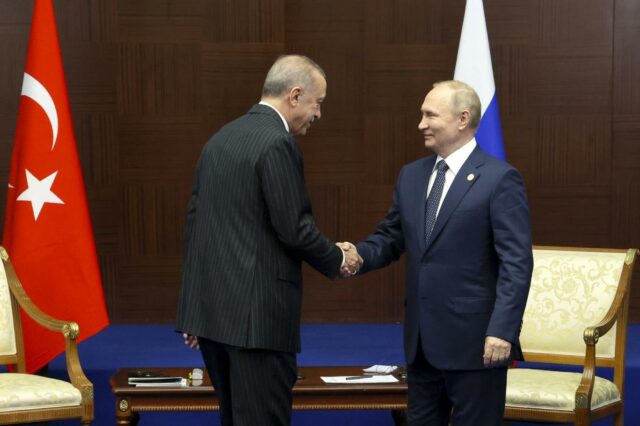
Will a Turkish Gas Hub Solve Eurasia’s Energy Troubles?
Publication: Eurasia Daily Monitor Volume: 20 Issue: 3
By:

Speaking at the Russian Energy Week held in Moscow in October 2022, President Vladimir Putin stated that Russia hoped to turn Turkey into an energy hub so that Russian gas may be transited to Europe via Turkey. Putin’s proposal surprised Ankara, though Turkish Minister of Energy and Natural Resources Fatih Donmez declared in a statement that the project should be seriously evaluated (Indyturk.com, October 17, 2022). While Russia’s offer was unexpected for the Turkish side, President Recep Tayyip Erdogan stated he viewed Russia’s proposal positively and that the Trakya region was being evaluated as the potential site for the distribution center.
It is quite clear that the project’s realization also depends on the interests and approaches of the European states, a fact that both Russia and Turkey understand well (Indyturk.com, October 17, 2022). After Russia’s re-invasion of Ukraine in February 2022, the European Union vowed to reduce the supply of energy resources (including gas) from Russia and diversify its energy sources. In fact, in October 2022, European Commission President Ursula Von der Leyen stated that Europe reduced its supply of Russian natural gas from 40 percent of total EU consumption at the beginning of the Ukraine crisis to 7.5 percent. Therefore, it is unrealistic to expect any positive attitudes emanating from Europe regarding new pipeline projects that involve Russia, given European opposition to the South Stream pipeline in 2014, Putin’s frequent use of energy blackmail vis-à-vis the EU and the adoption of a much tougher stance toward Russia today (see EDM, September 12). For its part, the United States has long argued that Europe should diversify its energy supplies and, by extension, reduce its dependence on Russia (Ura.news, October 20, 2022).
Regarding the construction of new infrastructure between Turkey and Russia, Zongqiang Luo, a senior analyst at Rystad Energy, estimated that it would take at least three to four years to complete the ambitious project (Euractiv, December 2, 2022). Additionally, given that the Black Sea is relatively deep, special production pipes produced by Germany and Japan must be used, and, due to the current state of relations, the active cooperation of German and Japanese companies with Russia remains a critical question (Indyturk.com, October 17, 2022). In truth, it will not be easy for Moscow to implement such a project with its own resources (the project’s total cost is still unknown), considering that Russia remains mired in an economic and transit bottleneck.
According to Aydin Sezer, former Turkish trade representative to Russia, as it would be impossible for Turkey to become a hub with Russian energy resources alone, any extensive development of energy infrastructure in the country will need to have access to other suppliers (TASS, October 22, 2022). As such, Ankara is taking advantage of access to gas from multiple locations, including Azerbaijani and Iranian natural gas, and it is planning to begin production at the offshore Sakarya gas field in 2024 (Trtworld.com, November 3, 2022).
Furthermore, Turkey continues to receive support in this regard from other regional countries. As Donmez recently pointed out, a number of countries, including Azerbaijan and the Central Asian states, support Turkey in both gas production and sales (Report.az, December 6, 2022). While Russia’s proposal for a gas hub in Turkey was clearly related to the sale of its own gas, Ankara, realizing that the project will fail by solely relying on Moscow, has begun laying the groundwork to ensure the purchase of gas from other sources. It is not a coincidence then that Turkish officials declared their hopes that Azerbaijan would also participate in the project. Subsequently, Erdogan proclaimed that he planned to discuss the creation of a natural gas hub with the leaders of Azerbaijan and Turkmenistan during his visit to Ashgabat in early December 2022 (Musavat.com, November 16, 2022). Consequently, on December 14, Azerbaijan, Turkey and Turkmenistan signed a memorandum of understanding to further develop energy cooperation and infrastructure among the three countries (Pressklub.az, December 14, 2022).
Given that the EU has used all possible means to reduce its gas dependence on Russia since February 2022, Brussels would not take warmly to an approach that only transited Russian gas. Having assessed this reality, the Turkish leadership has taken the path to ensure that gas from Azerbaijan, Iran, Israel and Turkmenistan will also be traded in the proposed hub (Musavat.com, November 16, 2022). That said, it should not be forgotten that, while European countries are unlikely to enter into direct contracts with Russia, some may be willing to buy gas from Moscow through third parties (Hellenicshippingnews.com, December 6, 2022). Additionally, taking into account the close relations between both countries, it seems Azerbaijan will look favorably on Turkey’s desire to become a unified gas center. With the proposed hub project, new prospects are emerging for the Trans-Caspian pipeline, which will deliver Turkmenistani gas along the bottom of the Caspian Sea to Turkey via Azerbaijan (Musavat.com, November 16, 2022). All these factors increase the possibility of Turkey becoming a unified gas hub for the Eurasian region.
The emergence of Turkey as a reliable country in the Ukraine crisis, especially regarding Moscow’s adherence to the grain exports agreement signed with Ankara, creates certain positive expectations regarding the proposed gas hub. However, the long-term continuation of the conflict in Ukraine could serve to aggravate the attitude of Western countries regarding any Russian involvement in the project. Furthermore, financial considerations will play a key role in determining the hub’s overall viability. It is highly likely that other gas suppliers, especially Azerbaijan and the Central Asian states, will support Turkey in this project. While political and economic difficulties remain, the realization of such a project could bring some additional comfort to both buyers and sellers in the region, provided Russian gas does not become the focal point for the proposed hub.



